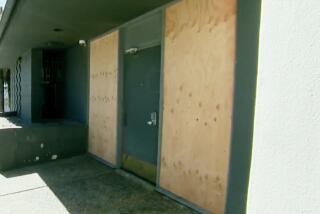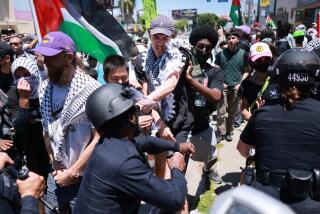Texas rabbi says he threw a chair at gunman and escaped with 2 other hostages

President Biden addressed the media Sunday about the hostage situation at a synagogue in Colleyville, Texas, emphasizing the importance of background checks.
- Share via
COLLEYVILLE, Texas — The rabbi of a Texas synagogue where a gunman took hostages during livestreamed services said Monday that he threw a chair at his captor before escaping with two others after an hours-long standoff, crediting past security training for getting himself and his congregants out safely.
Rabbi Charlie Cytron-Walker told “CBS Mornings” that he let the gunman inside the suburban Fort Worth synagogue Saturday because he appeared to need shelter. He said the man was not threatening or suspicious at first. Later, he heard a gun click as he was praying.
Another man held hostage, Jeffrey R. Cohen, described the ordeal on Facebook on Monday.
“First of all, we escaped. We weren’t released or freed,” said Cohen, who was one of four people in the synagogue for services that many other Congregation Beth Israel members were watching online.
Cohen said the men worked to keep the gunman engaged. They talked to the gunman, he lectured them. At one point as the situation devolved, Cohen said the gunman told them to get on their knees. Cohen recalled rearing up in his chair and slowly moving his head and mouthing “no.” As the gunman moved to sit back down, Cohen said Cytron-Walker yelled to run.
“The exit wasn’t too far away,” Cytron-Walker said. “I told them to go. I threw a chair at the gunman, and I headed for the door. And all three of us were able to get out without even a shot being fired.”
Authorities identified the hostage-taker as 44-year-old British national Malik Faisal Akram, who was killed Saturday night after the last three hostages ran out of the synagogue in Colleyville around 9 p.m. The first hostage was released shortly after 5 p.m.
The FBI on Sunday night issued a statement calling the ordeal “a terrorism-related matter, in which the Jewish community was targeted” and said the Joint Terrorism Task Force is investigating. The agency noted that Akram spoke repeatedly during negotiations about a prisoner who is serving an 86-year sentence in the U.S. The statement followed comments Saturday from the special agent in charge of the FBI’s Dallas field office that the hostage-taker was focused on an issue “not specifically related to the Jewish community.”
Akram could be heard ranting on a Facebook livestream of the services and demanding the release of Aafia Siddiqui, a Pakistani neuroscientist suspected of having ties to Al Qaeda who was convicted of trying to kill U.S. Army officers in Afghanistan.
“The last hour or so of the standoff, he wasn’t getting what he wanted. It didn’t look good. It didn’t sound good. We were terrified,” Cytron-Walker told “CBS Mornings.”
Video of the standoff’s end from Dallas TV station WFAA showed people running out a door of the synagogue, and then a man holding a gun opening the same door just seconds later before he turned around and closed it. Moments later, several shots and then an explosion could be heard.
Authorities have declined to say who shot Akram, saying it was still under investigation.
The investigation stretched to England, where late Sunday police in Manchester announced that two teenagers were in custody in connection with the standoff. Greater Manchester Police tweeted that counter-terrorism officers had made the arrests but did not say whether the pair faced any charges.
President Biden called the episode an act of terror. Speaking to reporters in Philadelphia on Sunday, Biden said Akram allegedly purchased a weapon on the streets.
Federal investigators believe Akram purchased the handgun used in the hostage-taking in a private sale, according to a person familiar with the matter who spoke on condition of anonymity because the investigation is ongoing. Akram arrived in the U.S. at John F. Kennedy International Airport in New York about two weeks ago, a law enforcement official said.
Akram arrived in the U.S. on a tourist visa from Great Britain, according to a U.S. official who spoke on condition of anonymity because the information was not intended to be public. London’s Metropolitan Police said in a statement that its counter-terrorism police were working with U.S. authorities about the incident.
U.K. Home Secretary Priti Patel told the House of Commons on Monday that she had spoken to her U.S. counterpart, Alejandro Mayorkas, and offered “the full support” of the police and security services in Britain in the investigation.
Akram used his phone during the course of negotiations to communicate with people other than law enforcement, according to a law enforcement official who was not authorized to discuss an ongoing investigation by name and spoke on condition of anonymity.
It wasn’t clear why Akram chose the synagogue, though the prison where Siddiqui is serving her sentence is in Fort Worth.
Akram, who was called Faisal by his family, was from Blackburn, an industrial city in northwest England. His family said he’d been “suffering from mental health issues.”
“We would also like to add that any attack on any human being, be it a Jew, Christian or Muslim, etc. is wrong and should always be condemned,” his brother, Gulbar Akram, wrote.
Community organizer Asif Mahmud, who has known the family for 30 years and attends the same mosque, said the family was devastated by what happened in Texas.
He “had mental health issues for a number of years,” Mahmud said. “The family obviously were aware of that … but nobody envisaged he would potentially go and do something like this.”
Mohammed Khan, leader of the local government council in Blackburn, said the community promotes peace across all faiths.
“Ours is a town where people from different backgrounds, cultures and faiths are welcomed, and it is a place where people get along and support one another,” Khan said in a statement.
Tucker reported from Washington, D.C. Also contributing to this report were Associated Press writers Jamie Stengle in Dallas and Paul J. Weber and Acacia Coronado in Austin; Michael Balsamo in Washington; Colleen Long in Philadelphia; Elliot Spagat in San Diego; Jennifer McDermott in Providence, R.I.; Michael R. Sisak in New York; Holly Meyer in Nashville; Issac Scharf in Jerusalem; and Danica Kirka in London.
More to Read
Sign up for Essential California
The most important California stories and recommendations in your inbox every morning.
You may occasionally receive promotional content from the Los Angeles Times.










